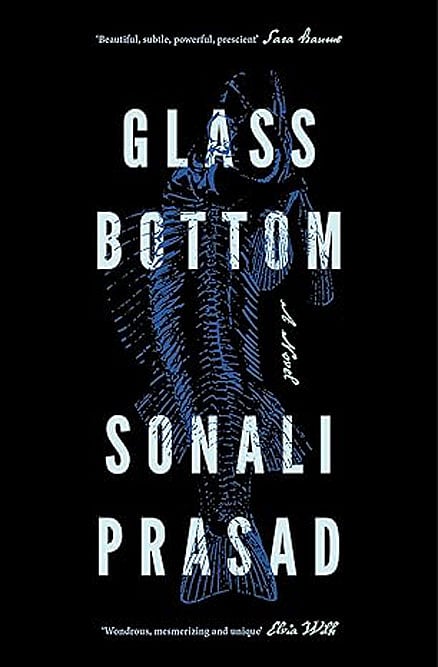Between Land and Water

A shore can be a strange place. By virtue of it being the meeting point of land and sea, it acquires a liminality where everything is possible. Sonali Prasad’s debut novel, Glass Bottom, is set against the “intractable” Arabian sea in an adjacent town and attempts to shine a light on the intricate, mesmeric web of connections that joins human beings to their environment. The former, while transient against the seeming permanence of nature, possesses enough power to damage the latter. It is ‘death’ by a thousand cuts, the irony being that the knife moves both ways and these destructive acts endanger everyone—human and non-human alike. Centring the precarity of life by the sea, Prasad showcases the strange richness of existence as well as its potential for drastic transformation in the blink of an eye.
Glass Bottom largely follows two mother-daughter pairs, one younger than the other. The first pair is Gul and Arth, where the former is an earth sciences professor and head of the department at the main university in the town while Arth is a part of the local art scene. It is clear that they are socio-economically comfortable. The same could not be said of Luni and Himmo, the second pair, where Luni works as a house help as well as at a hairdresser’s while Himmo is a young girl still occupying the childhood world of innocence. Their house was destroyed in a state demolition drive purportedly done because the neighbourhood was in a hazardous zone too close to the sea; they now live in a rented house.
AIming High
20 Feb 2026 - Vol 04 | Issue 59
India joins the Artificial Intelligence revolution with gusto
Edges dissolve and things meld into each other as a storm approaches the town. Gul and Arth grapple with their family history and their complicated relationship with each other. Luni embroiders using real human hair that she covertly collects from her clients. Himmo and other children play a game among the beach’s debris where the person who scavenges the most footwear wins. Nature thrums through every human interaction: “The only right thing to do then was to attend to the palpable forces of nature and time, the primordial tussle between land and water… that pure chaos of birth and death, being wrenched out of the water and returned to it, for any separation between the two powers was purely fictional—the land was, is and will again be water; water is land at its deepest.”
Unfortunately, after a point, Prasad tends to give in to abstract wordplay that is difficult to parse and comprehend. It is purple prose without a purpose and the glass bottom, which should have been clear and reflective, appears murky and incoherent. It, sort of, imitates the fecundity of liminal spaces and their tendency for ambiguous polyphony but such a linguistic conceit is easy to overdo, and it wears thin soon. The narrative, which mostly consists of short chapters, is broken up by infrequent almost chorus-like asides that are elusive to grasp. There is even a poem that bridges the first and second halves of the book. A Notes section at the end makes it clear that Prasad has incorporated references and allusions into the novel’s construction that are not immediately obvious. That being said, there is delightful wordplay that sets the tongue rolling.
Glass Bottom is certainly a fascinating example of ecofeminist fiction that mirrors the treatment of women in a patriarchal society with the treatment of nature in a capitalist system where the source of violence is often traced to the same beliefs about subjugation and power. I was more drawn to Luni’s and Himmo’s chapters as they added an extra dimension of class. It is also interesting to see how the chaos of the tempest replicates itself as chaos in the sense of self of the central characters where the past—someone’s dead grandfather, another’s missing father—comes bounding back to be confronted head on. This is a novel packed with promise and it is exciting to consider what Prasad will publish next.

